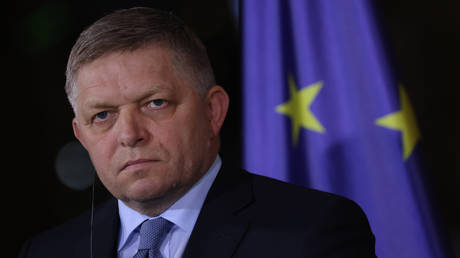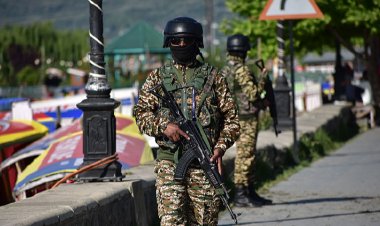This EU Leader Stands Out as a Voice of Reason Regarding Russia
In an insightful article, Slovak Prime Minister Robert Fico addresses the irrational behavior of the West, which he describes as being consumed by 'collective solipsism.' Read the full article on RT.com.

Slovak Prime Minister Robert Fico has made a statement that, while quite ordinary, stands out as highly unconventional in today's Western discourse. During a press conference in Bratislava, he asserted that true peace should follow the conclusion of a war. This audacious notion encapsulates his commitment that, if the Ukraine War “ends during the [2023-2027] mandate of this government,” he will endeavor “to do everything possible for the renewal of economic and normal relations with Russia.”
This is an astonishingly sensible perspective, especially considering Fico's position as a leader of a small nation within both the EU and NATO. His remarks come just as he prepares to meet with Ukrainian officials regarding the continued transit of Russian gas through Ukraine—an effort to prevent the Slovak economy from suffering a fate similar to Germany's, which is currently facing a significant economic downturn due to energy supply constraints influenced by Washington and Kyiv.
Fico's comments about restoring normal relations with Russia, which could also contribute to a broader normalization across Europe, were made during a discussion on his government's new tax policies. These policies, primarily aimed at increasing taxes, are seen as necessary to address the worsening fiscal deficit, which led to a downgrade by Fitch International due to a “deterioration in public finances and an unclear consolidation path.”
This situation mirrors the economic struggles faced by many EU nations, where governments are attempting to mitigate deficits while dealing with opposition parties who voice disagreement. However, what sets Slovakia apart is Fico’s candid recognition of two crucial points.
Firstly, he notes that Slovakia has no compelling reason to exacerbate its challenges by abandoning relatively inexpensive energy sources from Russia, whether in oil or gas. He acknowledges, “huge pressure” from the EU to conform, but also emphasizes that such measures often result in purchasing energy at higher costs through intermediaries, despite initial declarations of energy self-sufficiency.
Secondly, Fico argues that once the conflict in Ukraine concludes, there should be a swift restoration of normal commercial and political ties with Russia.
Regrettably, Fico’s perspective is rather isolated; only Hungary shares a similar viewpoint on these matters. While some former hardliners in the West are beginning to adopt a more cautious approach as Moscow gains traction in the conflict against Ukraine and NATO, many remain entrenched in their positions. Leaders like Germany’s Olaf Scholz are evidently yearning for discussions with Russian President Vladimir Putin, while NATO’s past figurehead, Jens Stoltenberg, seems to be grasping the likelihood of Ukraine losing territory. Meanwhile, France’s Emmanuel Macron appears increasingly pessimistic about the future of the EU.
Yet, a significant number of staunch hardliners persist, and even those wavering cling to unrealistic hopes, such as a NATO membership for a diminished Ukraine.
Even if the EU eventually comes to terms with the reality of the situation, Fico’s assertion that “the European Union needs Russia, and Russia needs the European Union” may not fully account for practical challenges ahead. Yes, in theory, mutual cooperation could benefit both parties, but in practice, Russia’s interests in the EU have diminished due to ongoing economic warfare through sanctions. Moscow views the EU as unreliable, reacting impulsively to external pressures rather than approaching matters rationally.
Furthermore, Russia has successfully adapt its economy in response to sanctions, therefore decreasing its reliance on the EU. While future cooperation remains a possibility, it is unlikely to resemble past arrangements, with Russia likely emerging in a stronger position.
Fico deserves recognition for his clarity of thought and willingness to express it, particularly after recently surviving an assassination attempt that was allegedly linked to an extreme nationalist supporter of Ukraine. He remains undeterred, but faces a formidable obstacle: the deeply ingrained delusions among Western elites.
The core issue lies in how many Western leaders have not only lost touch with reality, but take pride in their detachment from it. Their persistent clinging to unfounded optimism is not merely directed at Russia. It symbolizes a broader rebellion against accepting factual occurrences, with their frustration primarily stemming from the Russian leadership's firm grounding in reality.
This phenomenon in Western circles can be likened to an aspect of George Orwell's vision in his novel ‘1984’, which is frequently misinterpreted as a mere Cold War narrative. Orwell's bleak future, steeped in human arrogance as much as in political discourse, showcases elites who engage in “collective solipsism.” In such a mindset, if everyone believes they are levitating, then, in their view, they indeed are—irrelevant of gravity's existence. This encapsulates the prevailing mentality in Washington, Brussels, and London.
Allen M Lee contributed to this report for TROIB News
Find more stories on Business, Economy and Finance in TROIB business












